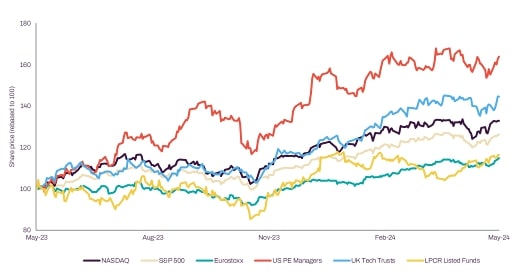Latent Value in Listed Private Equity

Richard Hickman, Managing Director HarbourVest Partners
Public markets are once again at new highs, having more than erased the losses of 2022. The Nasdaq is up nearly 40% in the last 12 months, signalling renewed enthusiasm for the technology sector.¹ Investors are scrambling for growth opportunities amid fresh optimism that macro risks are receding. Yet one corner of the public market remains depressed, offering latent value for investors prepared to look a little more closely.
Listed private capital funds offer investors the chance to invest in portfolios of private companies. In the UK these listed funds are commonly known as investment trusts, but the structure exists in Europe too. Some funds are focused on a specific sector such as technology, while others are widely diversified, offering access to private companies across sectors and at varying stages of development, from promising new start-ups all the way through to large, mature businesses. Historically, performance has been very strong, with the best funds multiplying investors’ capital many times over in the last 10 years, with the average share price return for the AIC’s listed UK private equity sector 562%² compared to the FTSE All World returning 131.4%³ as at 1st May 2024. Today, however, many of these listed funds now trade on discounts of more than 30%, and some more than 40%.⁴ This means that shares representing $1 of assets can be bought for less than 60 cents.
MoneyWeek
Subscribe to MoneyWeek today and get your first six magazine issues absolutely FREE

Sign up to Money Morning
Don't miss the latest investment and personal finances news, market analysis, plus money-saving tips with our free twice-daily newsletter
Don't miss the latest investment and personal finances news, market analysis, plus money-saving tips with our free twice-daily newsletter
But why? Surely markets are efficient, and share prices reflect a rational assessment of the fundamentals? History suggests that this is not necessarily always true. Share prices can fall and remain depressed for months or even years, driven more by investor psychology and technical factors than any real deterioration in underlying portfolios. Such periods offer compelling value for investors willing to tolerate a degree of volatility and to hold for the long term. Looking back over the last 15 years, returns to shareholders who bought at wide discounts have tended to be much stronger than those accruing to investors who bought when the skies were clear. Research from the AIC shows that when the average discount exceeded 10%, the average investment trust generated a return of 89.3% over the following five years.²
Since interest rates began to rise in early 2022, discounts on listed private capital funds have been unusually wide. Early fears of substantial write-downs in portfolios now appear overdone as valuations have been resilient and even resumed their upward trajectory in many cases. Private companies are more difficult to sell than other assets, and the challenged environment for exits in 2022-3 constrained liquidity in some funds. Yet a recovery appears underway here too, as trade buyers return and the IPO window re-opens. In Q1 2024, proceeds from US IPOs totalled $8.7bn: more than in Q1 2022 and Q1 2023 combined.⁵
The chart below shows the progress over the last year of various indices, compared to listed PE funds, listed US PE managers and UK-listed technology investment companies. While the US indices and listed managers have performed very strongly, share prices of the listed PE funds have been relatively weak, despite the strong performance of underlying portfolios in many cases.

Source: Refinitiv Workspace
Note: “LPCR” denotes the Listed Private Capital Roundtable, a group of listed funds who are members of the Invest Europe private capital trade association
In the UK market, persistent outflows from index-tracking ETFs and open-ended funds have weighed on share prices across the board, particularly in the FTSE 250 where most of the larger investment trusts reside. Compounded by a technicality around cost disclosures which has discouraged investors from buying listed funds specifically, the result has been wide and persistent discounts over the last two years.
These challenges appear to be abating, however, as global investors seek value in the UK market while the cost disclosure regime is now under review.
Look a little closer, and investors will find that listed private capital funds harbour high-quality assets that offer genuine diversification and a track record of outperforming public markets over the long term. Furthermore, at current discounts of more than 40% in some cases⁴, there is latent value waiting to be unlocked in the years to come – whether from further growth in the portfolio or an overdue re-rating of the shares, or even a combination of the two.
Richard Hickman is Managing Director, HarbourVest Partners of investment and operations for HVPE. For more information visit www.hvpe.com.
¹Source: Bloomberg, May 2024.
² Source: theaic.co.uk / Morningstar. Based on analysis of 128 five-year periods with the first period ending in June 2013 and the final period in January 2024 (all periods start and end at a month-end). The start date was determined by the availability of cum-income, fair-value discounts which are not available before June 2008. All data excludes VCTs.
³ Source: Refinitiv Workspace, May 2024.
⁴ Source: AIC/ Morningstar, May 2024.
⁵ Source: https://www.ey.com/en_us/insights/ipo/ipo-market-trends
Disclosure
This material is solely for informational purposes; the information should not be viewed as a current or past recommendation or an offer to sell or the solicitation to buy securities or adopt any investment strategy. In addition, the information contained in this document (i) may not be relied upon by any current or prospective investor and (ii) has not been prepared for marketing purposes. In all cases, interested parties should conduct their own investigation and analysis of the any information set forth herein and consult with their own advisors. HarbourVest has not acted in any investment advisory, brokerage or similar capacity by virtue of supplying this information. The opinions expressed herein represent the current, good faith views of the author(s) at the time of publication, are not definitive investment advice, and should not be relied upon as such. This material has been developed internally and/or obtained from sources believed to be reliable; however, HarbourVest does not guarantee the accuracy, adequacy or completeness of such information. The information is subject to change without notice and HarbourVest has no obligation to update you. There is no assurance that any events or projections will occur, and outcomes may be significantly different than the opinions shown here. This information, including any projections concerning financial market performance, is based on current market conditions, which will fluctuate and may be superseded by subsequent market events or for other reasons. The information contained herein must be kept strictly confidential and may not be reproduced or redistributed in any format without the express written approval of HarbourVest.
Get the latest financial news, insights and expert analysis from our award-winning MoneyWeek team, to help you understand what really matters when it comes to your finances.
MoneyWeek is written by a team of experienced and award-winning journalists, plus expert columnists. As well as daily digital news and features, MoneyWeek also publishes a weekly magazine, covering investing and personal finance. From share tips, pensions, gold to practical investment tips - we provide a round-up to help you make money and keep it.
-
 Early signs of the AI apocalypse?
Early signs of the AI apocalypse?Uncertainty is rife as investors question what the impact of AI will be.
-
 Reach for the stars to boost Britain's space industry
Reach for the stars to boost Britain's space industryopinion We can’t afford to neglect Britain's space industry. Unfortunately, the government is taking completely the wrong approach, says Matthew Lynn

